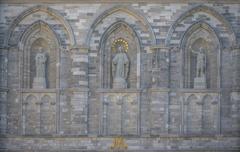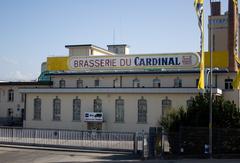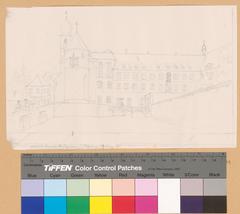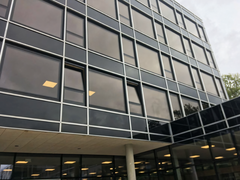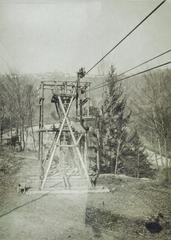Fribourg State Archives: Visiting Hours, Tickets, and Visitor Guide
Date: 15/06/2025
Introduction
Nestled in the heart of the Canton of Fribourg, the Fribourg State Archives (Archives de l’État de Fribourg / Staatsarchiv Freiburg) are the official repository for centuries of the region’s history. With holdings stretching over 10 to 15.5 linear kilometers, the archives house medieval charters, legal and notarial records, ecclesiastical and private collections, maps, photographs, and audiovisual materials dating from the 12th century to the present (Fribourg State Archives official site, myswitzerland.com).
The archives are not only a vital resource for researchers and genealogists but also a fascinating destination for history enthusiasts and cultural tourists. With modern, climate-controlled facilities, bilingual services (French and German), guided tours, and ongoing digitization projects, the Fribourg State Archives provide unparalleled access to the region’s rich documentary heritage. This guide offers comprehensive information on visiting hours, admission, accessibility, collections, guided tours, and tips for exploring the archives and surrounding historical sites (Digital Archives Portal, fr.ch).
Contents
- Introduction
- Visiting Information
- Opening Hours
- Tickets and Admission
- Accessibility
- Location and Transportation
- Guided Tours and Special Programs
- Historical Overview
- Collections and Holdings
- Architectural and Cultural Significance
- Preservation and Digital Access
- Visitor Services and Facilities
- Nearby Attractions
- Frequently Asked Questions (FAQ)
- Tips for a Memorable Visit
- Conclusion
- Sources
Visiting Information
Opening Hours
The Fribourg State Archives are generally open to the public Monday to Friday, 8:30 AM to 12:00 PM and 1:30 PM to 5:00 PM. Opening hours may occasionally vary due to holidays or special events, so it is recommended to confirm via the official website prior to your visit.
Tickets and Admission
- Admission is free for all visitors.
- No ticket is required for general visits or to access reading rooms and exhibitions.
- For access to specific archival documents, guided tours, or group visits, advance reservation is recommended and sometimes required.
Accessibility
- The archives building is fully accessible, with ramps, elevators, and accessible restrooms.
- Visitors with reduced mobility are encouraged to contact the staff in advance for any special accommodations.
Location and Transportation
- Address: Archives de l’État de Fribourg, Rue des Chanoines 26, 1700 Fribourg, Switzerland.
- The archives are centrally located, within walking distance of Fribourg’s Old Town and main train station.
- Easily accessible by public transport (bus and train).
- Limited parking is available nearby; using public transportation is advised for convenience (fr.ch).
Guided Tours and Special Programs
The Fribourg State Archives offer regular guided tours for individuals, groups, and school classes. These tours provide insights into the history of the archives, preservation techniques, and selected highlights from the collections. Educational workshops and thematic exhibitions are held throughout the year. Advance booking is required for group tours and is recommended for participation in special events.
For up-to-date information on current exhibitions, lectures, or cultural events, check the archives’ events calendar or contact the visitor information desk.
Historical Overview
Origins and Foundation
The origins of the Fribourg State Archives date to the 13th century, with the preservation of city charters, council minutes, and legal records reflecting Fribourg’s emergence as a city-state within the Swiss Confederation. Systematic archival practices developed in the 15th century, and the archives were formally established as an institution in the 19th century, coinciding with the creation of the modern Swiss federal state.
Evolution Through the Centuries
Over time, the archives expanded to include not only administrative and legal documents but also ecclesiastical records, private family collections, and audiovisual materials. The modern archives building, with its climate-controlled environment, ensures the ongoing preservation of these resources.
Collections and Holdings
The Fribourg State Archives’ holdings are extensive and diverse:
- Medieval and Early Modern Documents: Foundation charters (e.g., Fribourg’s founding charter from 1157), guild statutes, council minutes, and records from events like the Fribourg witch trials.
- Notarial and Legal Records: Contracts, wills, property deeds, and judicial proceedings, essential for genealogical and legal research.
- Visual and Cartographic Collections: Historical maps, urban plans, photographs, and postcards documenting Fribourg’s development.
- Private and Institutional Archives: Family papers, business records, and archives from local associations.
- Digitized Collections and Special Projects: Many collections are available online via the Digital Archives Portal, including notable projects such as scholarly editions of key historical documents.
Researchers can access searchable inventories and a specialized library catalogue (Discovery Fribourg-Freiburg), as well as genealogical resources like parish registers and heraldic archives.
Architectural and Cultural Significance
The archives are housed in a modern, purpose-built facility designed to protect fragile materials and provide comfortable spaces for research and exhibitions. The institution’s bilingual (French and German) services reflect the canton’s unique linguistic heritage, and its collections are central to understanding the evolution of Fribourg’s political, religious, and social landscape (opendata.swiss).
Preservation and Digital Access
Preservation is a top priority at the Fribourg State Archives, with professional conservation methods and ongoing digitization projects ensuring both the protection and accessibility of documents. The Digital Archives Portal allows researchers and the public to access thousands of records online, supporting open data initiatives and transparency.
Visitor Services and Facilities
- Reading Rooms: Spacious, well-equipped reading rooms are available for research. Reservations are recommended for access to specific documents.
- Research Support: Knowledgeable staff assist with catalog navigation, archival handling, and general inquiries.
- Visitor Amenities: Secure checkroom for bags and jackets (small deposit), microfilm readers, and personal workspace.
- Photography: Non-flash photography is generally permitted for personal research; restrictions may apply to fragile materials.
- Languages: Services are provided in French and German; some English support may be available.
Nearby Attractions
A visit to the archives can be combined with exploration of Fribourg’s historic Old Town, including:
- St. Nicholas Cathedral: A masterpiece of Gothic architecture.
- Pont de la Poya Bridge: One of the city’s iconic structures.
- Museum of Art and History: Exhibiting Fribourg’s artistic and cultural development.
- Medieval city walls and bridges: Offering scenic walking routes (myswitzerland.com).
Frequently Asked Questions (FAQ)
Q: What are the Fribourg State Archives’ visiting hours?
A: Monday to Friday, 8:30 AM to 12:00 PM and 1:30 PM to 5:00 PM. Always check the official website for updates.
Q: Is there an admission fee?
A: No, entry is free, but some services (e.g., photocopying) may incur a fee.
Q: Are guided tours available?
A: Yes, guided tours and educational workshops are available by appointment.
Q: Is the facility accessible?
A: Yes, the archives are fully accessible for visitors with reduced mobility.
Q: Can I take photographs inside the archives?
A: Non-flash photography is permitted for personal research, with some restrictions for sensitive materials.
Q: How do I request specific documents?
A: Submit document requests by 4:30 PM the day before your visit via email or the archives’ contact form.
Q: Is information available in English?
A: Most materials and staff assistance are in French and German; limited English support may be available.
Tips for a Memorable Visit
- Check for Updates: Before your visit, consult the archives’ website for current hours, exhibitions, and special events.
- Combine Activities: Take advantage of Fribourg’s cultural attractions nearby for a comprehensive experience.
- Plan Ahead: Reserve in advance if you wish to access specific documents or book a guided tour.
- Respect the Archives: Follow staff instructions for handling materials to help preserve the collections.
- Language Prep: Basic knowledge of French or German is helpful for navigating resources.
Conclusion
The Fribourg State Archives are a gateway to centuries of Swiss history, offering free public access, expert guidance, and a wealth of documentary treasures. Whether you are undertaking academic research, tracing your family roots, or simply exploring Fribourg’s vibrant past, a visit to the archives—enhanced by the city’s surrounding historical sites—promises a truly enriching experience.
Stay informed about visiting hours, exhibitions, and new resources by visiting the official websites, downloading the Audiala app, and following the archives on social media. Plan your visit today and immerse yourself in the remarkable story of Fribourg.
Sources
- Visiting the Fribourg State Archives: Hours, Tickets, and Historical Insights, 2025, Fribourg State Archives official site (https://www.fr.ch/sa)
- Fribourg State Archives: Visiting Hours, Tickets, and Exploring Fribourg’s Historical Heritage, 2025, Fribourg canton website (https://www.fr.ch/)
- Fribourg State Archives: Hours, Tickets, and Historical Collections, 2025, Archives de l’État de Fribourg (https://www.fr.ch/cha/aef)
- Fribourg State Archives Visiting Hours, Tickets, and Guide to Exploring Fribourg Historical Sites, 2025, e-codices and Fribourg Tourism (https://www.e-codices.unifr.ch/en/about/collections-info)
- Digital Archives Portal, 2025, Fribourg State Archives (https://www.fr.ch/sa/digital-archives)
- Federal Inventory of Swiss Heritage Sites (ISOS), 2025, opendata.swiss (https://opendata.swiss/en/dataset/bundesinventar-der-schutzenswerten-ortsbilder-der-schweiz-von-nationaler-bedeutung-isos)
- Discover Fribourg, 2025, myswitzerland.com (https://www.myswitzerland.com/en/destinations/fribourg/)
- Archives and History in Fribourg, 2019, Felixbq.com (https://www.felixbq.com/single-post/2019/09/16/Archives-and-history-in-Fribourg)
